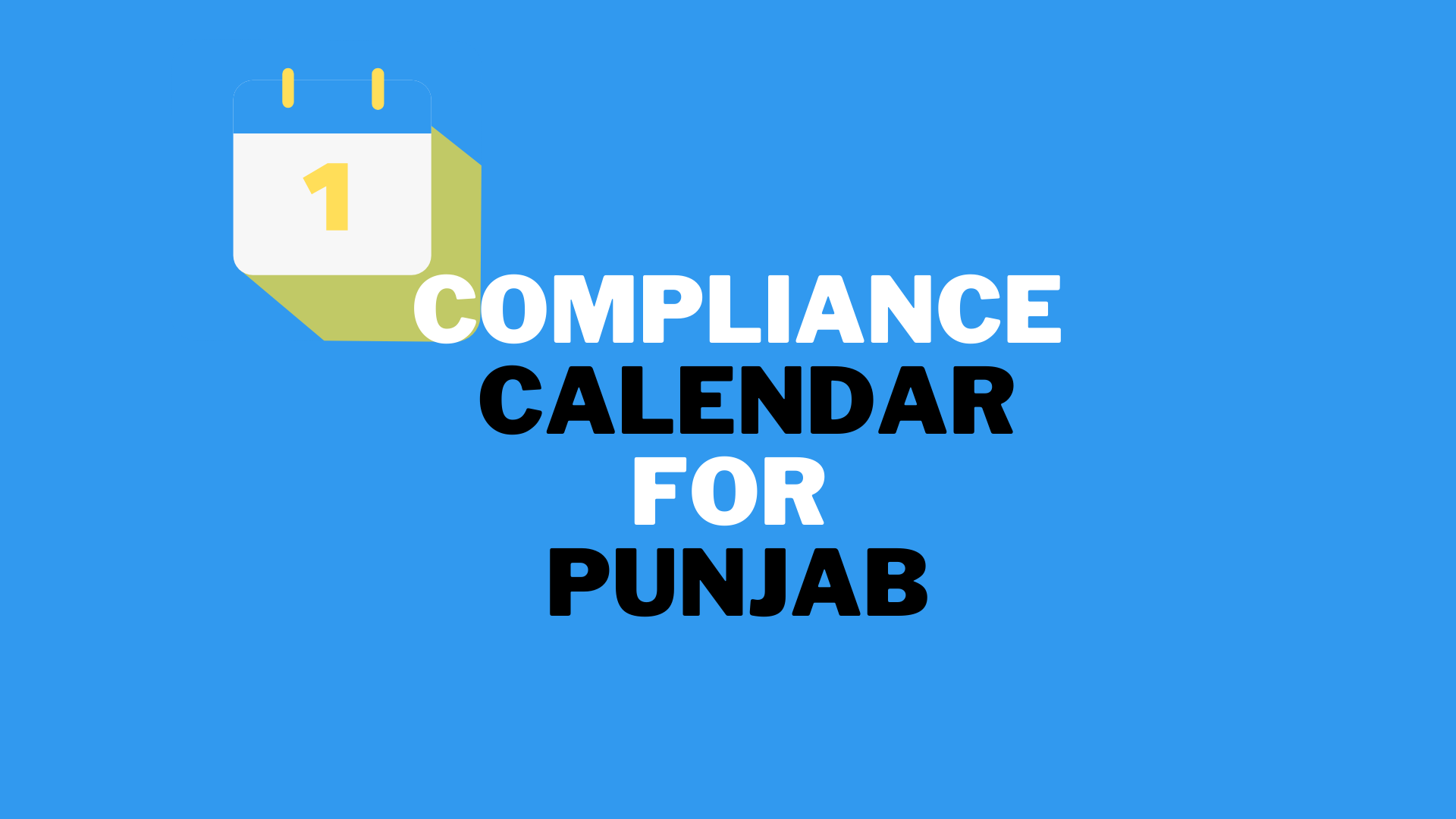Businesses would be so much easier to do if it just involved buying, selling, investing, and making profit. However, with running a business you have to abide by the rules of the state structured for your business.
Wondering how to go about doing that and what are these regulations for your state of Punjab? Worry not because a compliance calendar has been readied just for you by the Government.
We have not only provided the compliance calendar in this article for you, but we explain what each of these regulations are, what forms needs to filled, and what each of these forms are. To start with, let us quickly understand what is a compliance calendar, it’s benefits and what does it consist of.
This article covers the following:
- What is a compliance calendar?
- Why should you have a compliance calendar?
- What does a compliance calendar consist of?
- Compliance calendar for Punjab- 12 months of the year
What is a Compliance Calendar?
The compliance calendar is a way to keep track of all requirements across all jurisdictions to ensure that you are not leaving anything behind. When working in an organization, a compliance calendar can help pinpoint the compliance status and requirements in every jurisdiction to ensure efficient legal operations.
In smaller companies, the calendar stands equal importance less ensuring entities remain in good standing and able to operate no matter where they are legal. Compliance calendars centralize those important dates and deadlines, tracking requirements such as critical regulations, reporting obligations, industry filings, permits, and accreditations. And it doesn’t just look at the external obligations; internal events could also be added to your compliance calendar.
Why Should You Have a Compliance Calendar?
Being an entrepreneur includes shuffling many assignments, one of the more significant being ensuring you're consistent with every one of the nearby and government guidelines that apply to your endeavor.
It requires you to be in alignment with all the government guidelines that apply to your company. Setting up a compliance calendar can assist you with dealing with this part of your business by guaranteeing you don't miss any important dates or deadlines.
A compliance calendar monitors your organization's necessary filings in general, their due dates, and related subtleties so you can try not to cause any fines or different punishments for late filings or missing data.
What Does a Compliance Calendar Consist of?
What lies in your compliance calendar relies intensely upon the kind of business you run and the consistent dates. Recording cutoff times and timing differ by state and industry. Some are progressing, month to month, or quarterly, like assessment installments.
Additionally, some business recording commitments, including many kinds of permits and grant restorations, happen yearly. A yearly compliance calendar can assist you with monitoring these sorts of yearly documenting deadlines.
Other significant dates you may remember for your compliance incorporate filings for corporate gathering minutes and timetables, yearly reports documenting cutoff times, and any extraordinary occasions connected with consistency exercises.
Suppose you want to stay on top of important deadlines and keep your business running smoothly. In that case, you may consider handing over some of these responsibilities to an online services company like Deskera to make sure nothing falls through the proverbial cracks.
Such services help you with not only can an outside provider determine what you need to do and how to do it, but most providers offer systems with automatic reminders to remove all the guesswork about regulatory deadlines. Best of all, with your compliance obligations under control, you can spend your time where it matters developing and growing your business instead of worrying about missing a deadline.
Compliance Calendar for Punjab
January 2022- Compliance Calendar for Punjab
The Factories Act 1948- Due Date 15th Jan
The Factories Act, 1948 is social legislation that has been enacted for occupational safety, health, and welfare of workers at workplaces. The Act's objective is to regulate the conditions of work in manufacturing establishments coming within the definition of the term 'factory' as used in the Act.
Applicability of the Act
The Act applies to all the factories, including State, and Central Government, to the premises wherein:
- 10 or more workers are employed with power and engaged in manufacturing activities.
- 20 or more workers are employed without power and engaged in manufacturing activities.
- Less than 10 workers if the State Government notifies the activity.
The Employment Exchange (CNV) Act 1959- Due Date 15th Jan
The Employment Exchanges (Compulsory Notification of Vacancies) Act was enacted in 1959 to provide for compulsory notification of vacancies to the Employment Exchanges and for the rendition of returns relating to the Employment situation by the employers. This act came into force with effect from 1st May 1960.
The Employee’s Provident Fund Act- Due Date 15th Jan
This Act provides the institution of provident funds, pension funds, and deposit-linked insurance funds for employees. Employees' Provident Fund Organization (EPFO) is one of India's largest social security organizations in terms of the number of covered beneficiaries and the volume of financial transactions undertaken.
Applicability of the act
The Employees’ Provident Funds and Miscellaneous Provisions Act provides for the compulsory contributory funds for an employee's future after his/her retirement or for his/her dependents in case of the employee's early death. It extends to the whole of India except the State of Jammu and Kashmir and is applicable to:
- Every factory engaged in any industry specified in Schedule 1 in which 20 or more persons are employed.
- Every other establishment is employing 20 or more persons or class of such establishments that the Central Govt. may notify.
- Any other establishment so notified by the Central Government even if employing less than 20 persons.
Every employee, including the one employed through a contractor (but excluding an apprentice engaged under the Apprentices Act or under the standing orders of the establishment and casual laborers), who is in receipt of wages up to Rs.15,000 p.m. shall be eligible for becoming a member of the fund. The condition of three months continuous service or 60 days of actual work for members of the scheme has been removed.
Maternity Benefit Act 1961- 21st Jan
An Act to regulate the employment of women in certain establishments for a certain period before and after childbirth and to provide for maternity benefits and certain other benefits.
Applicability of the Act
- Extends to the whole of India.
- Applicable to mines, factories, plantations, shops, and commercial establishments.
- For a woman employed, whether directly or through any agency, for wages in any establishment.
The Employee’s State Insurance Act, 1948- Due Date 21st Jan
The Employees’ State Insurance Scheme is an integrated measure of Social Insurance embodied in the Employees’ State Insurance Act. It aims to protect employees, as defined in the Employees’ State Insurance Act, 1948, against the impact of incidences of sickness, maternity, disablement, and death due to employment injury and to provide medical care to the insured persons and their families.
Applicability of the Act
- All States in India except for Nagaland, Manipur, Sikkim, Arunachal Pradesh, and Mizoram.
- Applicable to Delhi, Chandigarh, and Puducherry.
- Applicable to non-seasonal factories employing 10 or more persons.
- The scheme has been extended to shops, hotels, restaurants, cinemas (including preview theatres), road-motor transport undertakings, and newspaper establishments employing 20* or more persons.
- The scheme has been extended to private medical and educational institutions employing 20* or more persons in certain States/UTs.
- The existing wage limit for coverage under the Act is Rs. 21,000/- per month ( w.e.f. 01.01.2017).
The Employees’ Provident Fund & Miscellaneous Provisions Act, 1952- Due Date 25th Jan
This Act provides the institution of provident funds, pension funds, and deposit-linked insurance funds for employees. Employees' Provident Fund Organization (EPFO) is one of the largest social security organizations in terms of the number of covered beneficiaries and the volume of financial transactions undertaken.
Applicability of this Act
The Employees’ Provident Funds and Miscellaneous Provisions Act provides for the compulsory contributory funds for an employee's future after his/her retirement or for his/her dependents in case of the employee's early death. It extends to the whole of India except the State of Jammu and Kashmir and is applicable to:
- Every factory engaged in any industry specified in Schedule 1 in which 20 or more persons are employed.
- Every other establishment is employing 20 or more persons or class of such establishments that the Central Govt. may notify.
- Any other establishment so notified by the Central Government even if employing less than 20 persons.
Every employee, including the one employed through a contractor (but excluding an apprentice engaged under the Apprentices Act or under the standing orders of the establishment and casual laborers), who is in receipt of wages up to Rs.15,000 p.m. shall be eligible for becoming a member of the fund. The condition of three months continuous service or 60 days of actual work for members of the scheme has been removed.
The Contract Labour (R&A) Act 1970- Due Date 29th January
The object of the Contract Labor Regulation and Abolition) Act 1970 is to prevent the exploitation of contract labor and introduce better work conditions. A workman is deemed to be employed as Contract Labor when he is hired in connection with the work of an establishment by or through a Contractor.
Contract workers are indirect employees. Contract Labor differs from Direct Labor in terms of the employment relationship with the establishment and method of wage payment. Contract Labor, by and large, is not borne on payroll nor is paid directly. The Contract Workmen are hired, supervised, and remunerated by the Contractor, who, in turn, is remunerated by the Establishment hiring the Contractor's services.
Applicability of the Act
The Act applies to the Principal Employer of an Establishment and the Contractor wherein 20 or more workmen are employed or were employed even for one day during the preceding 12 months as Contract Labor.
For the purpose of calculating the number, contract labor employed for different purposes through different contractors has to be taken into consideration. This Act does not apply to the Establishments where work performed is of intermittent or seasonal nature.
If a Principal Employer or the Contractor falls within the vicinity of this Act then, such Principal Employer and the Contractor have to apply for Registration of the Establishment and License, respectively.
The contractor Act also provides for Temporary Registration in case the Contract Labor is hired for a period of not more than 15 days. Any change occurring in the particulars specified in the Registration or Licensing Certificate needs to be informed to the concerned Registering Officer within 30 days of such change.
The Punjab Factories Rules, 1952- Due Date 30th January
The Factories Act is social legislation that has been enacted for occupational safety, health, and welfare of workers at the workplace. The State of Andhra Pradesh has formulated its rules as envisaged under the Act, and they are known as The Punjab Factories Rules, 1952.
Applicability of the Act
The Act is applicable to all factories, including State and Central Government, in the premises wherein:
- 10 or more workers are employed with the use of power.
- 20 or more workers are employed without the use of power.
- Less than 10 workers, if the activity is notified by the State Government.
Inter-State Migrant Workman Act- Due Date 30th Jan
The Act is intended to regulate the employment of inter-state migrant workmen and provide for their service conditions. It applies to every establishment, and the contractor, who employ five or more inter-state of Pass-Book to every inter-state migrant workmen with full details, payment of displacement allowance equivalent to 50% of monthly wages or Rs.75/- whichever is higher, payment of journey allowance including payment of wage during of the period of the journey, suitable residential accommodation, medical facilities and protective clothing, payment of wages, equal pay for equal work irrespective of sex, etc.
The main responsibility for enforcement of the provision of the Act lies with the Central and the State Governments/Union Territories in the establishment falling in the Central and State Sphere, respectively.
The Posh Act 2013 (Sexual Harassment of Women at Workplace- Prevention, Prohibition and Redressal)- Due Date 31st Jan
The PoSH Act lays down steps for employers to ensure that women are protected against sexual harassment at all workplaces, be it in public or private.
The Act defines what conduct and act amount to sexual harassment, viz., the following circumstances, among other circumstances, if they occur or are present in relation to or connected with any act or behavior of sexual harassment may amount to sexual harassment.
The Act defines an ‘employee’ fairly in wide to cover regular, temporary, ad hoc employees, individuals engaged on a daily wage basis, either directly or through an agent, contract laborers, co-workers, probationers, trainees, and apprentices, with or without the knowledge of the principal employer, whether for remuneration or not, working on a voluntary basis or otherwise, whether the terms of employment are express or implied.
The Act defines an ‘employer’ as any person who is responsible for management, supervision, and control of the workplace and includes persons who formulate and administer policies of such an organization.
Rules
The Act requires the employer to constitute an ‘internal committee’ (IC) at each of its office/branches that comprise ten (10 Nos.) or more employees. This IC shall hear and redress the grievances and complaints pertaining to sexual harassment. If the employer fails to constitute, it is liable to pay the fine prescribed under the Act.
The IC shall consist of a Presiding Officer who shall be a woman employed at a senior level at the workplace from amongst the employees, with Members comprising not less than 2 members from amongst employees and an External Member from an NGO or association committed to the cause of women or person familiar with issues relating to sexual harassment. No less than half of the IC Members shall be women, and a minimum of 3 Members of the IC, including the Presiding Officer, are to be present for conducting the inquiry.
The Committee is required to complete the inquiry within a time period of 90 days. On completion of the inquiry, the report will be sent to the employer or the District Officer; as the case may be, they are mandated to act on the report within 60 days.
The District Officer is required to constitute a Local Complaints Committee at each district and, if required, at the block level. The Complaints Committees have the powers of civil courts for gathering evidence. The Complaints Committees are required to provide for conciliation before initiating an inquiry if requested by the complainant.
The inquiry process under the Act should be confidential, and the Act lays down a penalty of Rs. 5,000/- on the person who has breached confidentiality.
The Act requires employers to conduct education and develop policies against sexual harassment, among other obligations.
Penalties have been prescribed for employers. Non-compliance with the provisions of the Act shall be punishable with a fine of up to ₹ 50,000. Repeated violations may lead to higher penalties and cancellation of license or deregistration to conduct business.
The government can order an officer to inspect the workplace and records related to sexual harassment in any organization.
Under the Act, which also covers students in schools and colleges and patients in hospitals, employers, and local authorities, will have to set up grievance committees to investigate all complaints. Employers who fail to comply will be punished with a fine of up to Rs. 50,000/-.
February 2022- Compliance Calendar for Punjab
The Payment of Bonus Act- Due Date 1st February
The Payment of Bonus Act, 1965 provides the payment of bonus to persons employed in certain establishments, employing 20 or more persons, on the basis of profits or on production or productivity and matters connected therewith.
The minimum bonus of 8.33% is payable by every industry and establishment under section 10 of the Act. The maximum bonus, including a productivity-linked bonus that can be paid in any accounting year, shall not exceed 20% of the salary/wage of an employee under section 31 A of the Act.
Applicability of the Act
The Act Applies to all Factories and every other establishment, which employs twenty or more workmen. The Payment of Bonus Act, 1965 provides for a minimum bonus of 8.33 percent of wages.
The salary limited fixed for eligibility purposes is Rs. 3,500 per month and the payment is subject to the stipulation that the bonus payable to employees drawing wages or salary not exceeded to Rs.10000 per month would be calculated as if their salary or wages is Rs. 3,500 per month.
The Central Government is the appropriate authority in respect of the industries /establishments for which it is appropriate Government under the Industrial Disputes Act, 1947.
The Contract Labor Act 1970- Due Date
This Act regulates the employment of contract labor in certain establishments provides for the abolition of contract labor in certain circumstances and other connected matters. Central and State Rules are made to ensure effective administration and monitoring of the Act. Central and State rules are made to ensure effective administration and monitoring of the act.
Applicability of the Act
It extends to the whole of India and applies to every establishment or every contractor who employs or employed 20 or more workers on any day of the preceding 12 months as contract labor registration is compulsory to employ contract labor.
Provident Fund Act- Due Date 15th February
This Act provides the institution of provident funds, pension funds, and deposit-linked insurance funds for employees. Employees' Provident Fund Organisation (EPFO) is one of the largest social security organizations regarding the number of covered beneficiaries and the volume of financial transactions undertaken.
Applicability of the Act
The Employees’ Provident Funds and Miscellaneous Provisions Act provides for the compulsory contributory fund for an employee's future after his/her retirement or for his/her dependents in case of the employee's early death. It extends to the whole of India except the State of Jammu and Kashmir and is applicable to:
- Every factory engaged in any industry specified in Schedule 1 in which 20 or more persons are employed.
- Every other establishment is employing 20 or more persons or class of such establishments that the Central Govt. may notify.
- Any other establishment notified by the Central Government even if employing less than 20 persons.
Every employee, including the one employed through a contractor (but excluding an apprentice engaged under the Apprentices Act or the standing orders of the establishment and casual laborers), who receives wages up to Rs.15,000 p.m. shall be eligible for becoming a member of the fund. The condition of three months continuous service or 60 days of actual work for members of the scheme has been removed.
The Employees’ State Insurance Act, 1948- Due Date 21st February
The Employees’ State Insurance Scheme is an integrated measure of Social Insurance embodied in the Employees’ State Insurance Act. It aims to protect employees, as defined in the Employees’ State Insurance Act, 1948, against the impact of incidences of sickness, maternity, disablement, and death due to employment injury and to provide medical care to the insured persons and their families.
Applicability of the Act
- All States in India except for Nagaland, Manipur, Sikkim, Arunachal Pradesh, and Mizoram.
- Applicable to Delhi, Chandigarh, and Puducherry.
- Applicable to non-seasonal factories employing 10 or more persons.
- The scheme has been extended to shops, hotels, restaurants, cinemas (including preview theatres), road-motor transport undertakings, and newspaper establishments employing 20* or more persons.
- The scheme has been extended to private medical and educational institutions employing 20* or more persons in certain States/UTs.
- The existing wage limit for coverage under the Act is Rs. 21,000/- per month ( w.e.f. 01.01.2017).
Provident Fund Act- Due Date 25th February
This is an Act to provide for the institution of provident funds, pension funds, and deposit-linked insurance funds for employees. Employees' Provident Fund Organisation (EPFO) is one of the largest social security organizations in India in terms of the number of covered beneficiaries and the volume of financial transactions undertaken.
Applicability of the Act
The Employees’ Provident Funds and Miscellaneous Provisions Act provides for the compulsory contributory funds for the future of an employee after his/her retirement or for his/her dependents in case of the employee's early death. It extends to the whole of India except the State of Jammu and Kashmir and is applicable to:
- Every factory engaged in any industry specified in Schedule 1 in which 20 or more persons are employed.
- Every other establishment employing 20 or more persons or class of such establishments that the Central Govt. may notify.
- Any other establishment so notified by the Central Government even if employing less than 20 persons.
Every employee, including the one employed through a contractor (but excluding an apprentice engaged under the Apprentices Act or under the standing orders of the establishment and casual laborers), who is in receipt of wages up to Rs.15,000 p.m. shall be eligible for becoming a member of the fund. The condition of three months continuous service or 60 days of actual work for members of the scheme has been removed.
March 2022- Compliance Calendar for Punjab
Provident Fund Act- Due Date 15th March
This Act provides the institution of provident funds, pension funds, and deposit-linked insurance funds for employees. Employees' Provident Fund Organisation (EPFO) is one of the largest social security organizations in terms of the number of covered beneficiaries and the volume of financial transactions undertaken.
Applicability of the Act
The Employees’ Provident Funds and Miscellaneous Provisions Act provides for the compulsory contributory funds for an employee's future after his/her retirement or for his/her dependents in case of the employee's early death. It extends to the whole of India except the State of Jammu and Kashmir and applies to:
- Every factory engaged in any industry specified in Schedule 1 in which 20 or more persons are employed.
- Every other establishment is employing 20 or more persons or class of such establishments that the Central Govt. may notify.
- Any other establishment so notified by the Central Government even if employing less than 20 persons.
Every employee, including the one employed through a contractor (but excluding an apprentice engaged under the Apprentices Act or under the standing orders of the establishment and casual laborers), who is in receipt of wages up to Rs.15,000 p.m. shall be eligible for becoming a member of the fund. The condition of three months continuous service or 60 days of actual work for members of the scheme has been removed.
The Employees' State Insurance Act, 1948- Due Date 21st March
The Employees’ State Insurance Scheme is an integrated measure of Social Insurance embodied in the Employees’ State Insurance Act. It aims to protect employees, as defined in the Employees’ State Insurance Act, 1948, against the impact of incidences of sickness, maternity, disablement, and death due to employment injury and to provide medical care to the insured persons and their families.
Applicability of the Act
- All States in India except for Nagaland, Manipur, Sikkim, Arunachal Pradesh, and Mizoram.
- Applicable to Delhi, Chandigarh, and Puducherry.
- Applicable to non-seasonal factories employing 10 or more persons.
- The scheme has been extended to shops, hotels, restaurants, cinemas (including preview theatres), road-motor transport undertakings, and newspaper establishments employing 20* or more persons.
- The scheme has been extended to private medical and educational institutions employing 20* or more persons in certain States/UTs.
- The existing wage limit for coverage under the Act is Rs. 21,000/- per month ( w.e.f. 01.01.2017).
Provident Fund Act- Due Date 15th March
This is an Act to provide for the institution of provident funds, pension funds, and deposit-linked insurance funds for employees. Employees' Provident Fund Organisation (EPFO) is one of the largest social security organizations in terms of the number of covered beneficiaries and the volume of financial transactions undertaken.
Applicability of the Act
The Employees’ Provident Funds and Miscellaneous Provisions Act provides for the compulsory contributory funds for an employee's future after his/her retirement or for his/her dependents in case of the employee's early death. It extends to the whole of India except the State of Jammu and Kashmir and is applicable to:
- Every factory engaged in any industry specified in Schedule 1 in which 20 or more persons are employed.
- Every other establishment employing 20 or more persons or class of such establishments that the Central Govt. may notify.
- Any other establishment so notified by the Central Government even if employing less than 20 persons.
Every employee, including the one employed through a contractor (but excluding an apprentice engaged under the Apprentices Act or under the standing orders of the establishment and casual laborers), who is in receipt of wages up to Rs.15,000 p.m. shall be eligible for becoming a member of the fund. The condition of three months continuous service or 60 days of actual work for members of the scheme has been removed.
April 2022- Compliance Calendar for Punjab
Punjab Labour Welfare Fund Act
The Punjab Labour Welfare Fund Act 1965 is an act to provide for the constitution of a Fund for the financing of activities to promote the welfare of labor in the State of Punjab and for conducting such activities and for certain other purposes.
Applicability of the Act
The Punjab Labour Welfare Fund Act 1965 extends to the entire state of Punjab.
The Employment Exchange (CNV) Act, 1959
The Employment Exchanges (Compulsory Notification of Vacancies) Act was enacted in 1959 to provide for compulsory notification of vacancies to the Employment Exchanges and for the rendition of returns relating to the Employment situation by the employers. This act came into force with effect from 1st May, 1960.
Punjab Professional Tax on Professions, Trades, Callings and Employment Act 1977- Due Date 29th February
The Punjab State Tax on Professions, Trades, Callings and Employment Act, 1977 (commonly known as Profession Tax Act) came into force with effect with the object of levying tax on professions, trades, callings, and employments. It extends to the whole state of Punjab.
Applicability of the Act
- These rules may be called the Punjab Professions and Trades Tax Rules, 1977.
- These rules shall come into force at once.
(a) “Act” means the Punjab Finance Act, 1977;
(b) “District Officer / Director, Excise and Taxation” means an officer appointed by the Government to discharge the functions and to perform the duties of a District Officer / Director, Excise and Taxation, in any specified area.
(c) “District Officer/ Excise and Taxation Officer” or Deputy District Officer/ Excise and Taxation Officer mean an officer appointed by the Government to discharge the functions and to perform the duties as such in any specified area.
(d) “Drawing and Disbursing Officer” means an officer from whom a person serving under the Government of the Punjab or Government of Pakistan draws his pay.
(e) “Form” means a Form appended to these rules and includes a statement or communication on plain paper containing the same particulars as are specified in the corresponding forms.
(f) “Principal Officer” means the Secretary, Treasurer, manager, agent or an executive officer of a local authority, company, body or association and includes any local representative of such authority, company, body or association upon whom the “District Officer / Excise and Taxation Officer or Deputy district Officer / Excise & Taxation Officer”, as the case may be,” has served a notice of his intention to treat him as the principal officer thereof.
(g) “Tax” means the tax payable under Section 3 of the Act.
(h) “Treasury” means a treasury or sub-treasury or a branch of a Bank in Punjab authorized to receive payment on behalf of the Government.
(i) “Year” means the financial year commencing from the 1st July and ending on the 30th June.
May 2022- Compliance Calendar for Punjab
Provident Fund Act- Due Date 15th May
This is an Act to provide for the institution of provident funds, pension funds, and deposit-linked insurance funds for employees. Employees' Provident Fund Organisation (EPFO) is one of the largest social security organizations in terms of the number of covered beneficiaries and the volume of financial transactions undertaken.
Applicability of the Act
The Employees’ Provident Funds and Miscellaneous Provisions Act provides for the compulsory contributory fund for an employee's future after his/her retirement or for his/her dependents in case of the employee's early death. It extends to the whole of India except the State of Jammu and Kashmir and is applicable to:
- Every factory engaged in any industry specified in Schedule 1 in which 20 or more persons are employed.
- Every other establishment employing 20 or more persons or class of such establishments that the Central Govt. may notify.
- Any other establishment so notified by the Central Government even if employing less than 20 persons.
Every employee, including the one employed through a contractor (but excluding an apprentice engaged under the Apprentices Act or under the standing orders of the establishment and casual laborers), who is in receipt of wages up to Rs.15,000 p.m. shall be eligible for becoming a member of the fund. The condition of three months continuous service or 60 days of actual work for members of the scheme has been removed.
The Employee’s State Insurance Act, 1948- Due Date 21st May
The Employees’ State Insurance Scheme is an integrated measure of Social Insurance embodied in the Employees’ State Insurance Act. It aims to protect employees, as defined in the Employees’ State Insurance Act, 1948, against the impact of incidences of sickness, maternity, disablement, and death due to employment injury and to provide medical care to the insured persons and their families.
Applicability of the Act
- All States in India except for Nagaland, Manipur, Sikkim, Arunachal Pradesh, and Mizoram.
- Applicable to Delhi, Chandigarh, and Puducherry.
- Applicable to non-seasonal factories employing 10 or more persons.
- The scheme has been extended to shops, hotels, restaurants, cinemas (including preview theatres), road-motor transport undertakings, and newspaper establishments employing 20* or more persons.
- The scheme has been extended to private medical and educational institutions employing 20* or more persons in certain States/UTs.
- The existing wage limit for coverage under the Act is Rs. 21,000/- per month ( w.e.f. 01.01.2017).
Provident Fund Act- Due Date 25th May
This is an Act to provide for the institution of provident funds, pension funds, and deposit-linked insurance fund for employees. Employees' Provident Fund Organisation (EPFO) is one of the largest social security organizations in India in terms of the number of covered beneficiaries and the volume of financial transactions undertaken.
Applicability of the Act
The Employees’ Provident Funds and Miscellaneous Provisions Act provides for the compulsory contributory fund for an employee's future after his/her retirement or for his/her dependents in case of the employee's early death. It extends to the whole of India except the State of Jammu and Kashmir and is applicable to:
- Every factory engaged in any industry specified in Schedule 1 in which 20 or more persons are employed.
- Every other establishment employing 20 or more persons or class of such establishments that the Central Govt. may notify.
- Any other establishment so notified by the Central Government even if employing less than 20 persons.
Every employee, including the one employed through a contractor (but excluding an apprentice engaged under the Apprentices Act or under the standing orders of the establishment and casual laborers), who is in receipt of wages up to Rs.15,000 p.m. shall be eligible for becoming a member of the fund. The condition of three months continuous service or 60 days of actual work for members of the scheme has been removed.
June 2022- Compliance Calendar for Punjab
Provident Fund Act- Due Date 15th June
This is an Act to provide for the institution of provident funds, pension funds, and deposit-linked insurance funds for employees. Employees' Provident Fund Organization (EPFO) is one of the largest social security organizations in India in terms of the number of covered beneficiaries and the volume of financial transactions undertaken.
Applicability of the Act
The Employees’ Provident Funds and Miscellaneous Provisions Act provides for compulsory contributory fund for the future of an employee after his/her retirement or for his/her dependents in case of the employee's early death. It extends to the whole of India except the State of Jammu and Kashmir and is applicable to:
- Every factory engaged in any industry specified in Schedule 1 in which 20 or more persons are employed.
- Every other establishment employing 20 or more persons or class of such establishments that the Central Govt. may notify.
- Any other establishment so notified by the Central Government even if employing less than 20 persons.
Every employee, including the one employed through a contractor (but excluding an apprentice engaged under the Apprentices Act or under the standing orders of the establishment and casual laborers), who is in receipt of wages up to Rs.15,000 p.m. shall be eligible for becoming a member of the fund. The condition of three months continuous service or 60 days of actual work for members of the scheme has been removed.
The Employee’s State Insurance Act, 1948- Due Date 21st June
The Employees’ State Insurance Scheme is an integrated measure of Social Insurance embodied in the Employees’ State Insurance Act. It aims to protect employees, as defined in the Employees’ State Insurance Act, 1948, against the impact of incidences of sickness, maternity, disablement, and death due to employment injury and to provide medical care to the insured persons and their families.
Applicability of the Act
- All States in India except for Nagaland, Manipur, Sikkim, Arunachal Pradesh, and Mizoram.
- Applicable to Delhi, Chandigarh, and Puducherry.
- Applicable to non-seasonal factories employing 10 or more persons.
- The scheme has been extended to shops, hotels, restaurants, cinemas (including preview theatres), road-motor transport undertakings, and newspaper establishments employing 20* or more persons.
- The scheme has been extended to private medical and educational institutions employing 20* or more persons in certain States/UTs.
- The existing wage limit for coverage under the Act is Rs. 21,000/- per month ( w.e.f. 01.01.2017).
Provident Fund Act- Due Date 25th June
This is an Act to provide for the institution of provident funds, pension funds, and deposit-linked insurance fund for employees. Employees' Provident Fund Organisation (EPFO) is one of the largest social security organizations in India in terms of the number of covered beneficiaries and the volume of financial transactions undertaken.
Applicability of the Act
The Employees’ Provident Funds and Miscellaneous Provisions Act provides for compulsory contributory fund for the future of an employee after his/her retirement or for his/her dependents in case of the employee's early death. It extends to the whole of India except the State of Jammu and Kashmir and is applicable to:
- Every factory engaged in any industry specified in Schedule 1 in which 20 or more persons are employed.
- Every other establishment employing 20 or more persons or class of such establishments that the Central Govt. may notify.
- Any other establishment so notified by the Central Government even if employing less than 20 persons.
Every employee, including the one employed through a contractor (but excluding an apprentice engaged under the Apprentices Act or under the standing orders of the establishment and casual laborers), who is in receipt of wages up to Rs.15,000 p.m. shall be eligible for becoming a member of the fund. The condition of three months continuous service or 60 days of actual work for members of the scheme has been removed.
July 2022- Compliance Calendar for Punjab
The Punjab Factories Rules, 1952- Due Date 14th July
The Factories Act is social legislation that has been enacted for occupational safety, health, and welfare of workers at the workplace. The State of Andhra Pradesh has formulated its rules as envisaged under the Act, and they are known as The Punjab Factories Rules, 1952.
Applicability of the Act
The Act is applicable to all factories, including State and Central Government, in the premises wherein:
- 10 or more workers are employed with the use of power.
- 20 or more workers are employed without the use of power.
- Less than 10 workers, if the activity is notified by the State Government.
The Employment Exchanges (Compulsory Notification of Vacancies) Act- Due Date 15th July
The Employment Exchanges (Compulsory Notification of Vacancies) Act was enacted in 1959 to provide for compulsory notification of vacancies to the Employment Exchanges and for the rendition of returns relating to the Employment situation by the employers. This act came into force with effect from 1st May 1960.
Provident Fund Act- Due Date 15th July
This is an Act to provide for the institution of provident funds, pension funds, and deposit-linked insurance funds for employees. Employees' Provident Fund Organisation (EPFO) is one of the largest social security organizations in terms of the number of covered beneficiaries and the volume of financial transactions undertaken.
Applicability of the Act
The Employees’ Provident Funds and Miscellaneous Provisions Act provides for compulsory contributory funds for the future of an employee after his/her retirement or for his/her dependents in case of the employee's early death. It extends to the whole of India except the State of Jammu and Kashmir and is applicable to:
- Every factory engaged in any industry specified in Schedule 1 in which 20 or more persons are employed.
- Every other establishment employing 20 or more persons or class of such establishments that the Central Govt. may notify.
- Any other establishment so notified by the Central Government even if employing less than 20 persons.
Every employee, including the one employed through a contractor (but excluding an apprentice engaged under the Apprentices Act or under the standing orders of the establishment and casual laborers), who is in receipt of wages up to Rs.15,000 p.m. shall be eligible for becoming a member of the fund. The condition of three months continuous service or 60 days of actual work for members of the scheme has been removed.
The Employees’ State Insurance Act, 1948- Due Date 21st July
The Employees’ State Insurance Scheme is an integrated measure of Social Insurance embodied in the Employees’ State Insurance Act. It aims to protect employees, as defined in the Employees’ State Insurance Act, 1948, against the impact of incidences of sickness, maternity, disablement, and death due to employment injury and to provide medical care to the insured persons and their families.
Applicability of the Act
- All States in India except for Nagaland, Manipur, Sikkim, Arunachal Pradesh, and Mizoram.
- Applicable to Delhi, Chandigarh, and Puducherry.
- Applicable to non-seasonal factories employing 10 or more persons.
- The scheme has been extended to shops, hotels, restaurants, cinemas (including preview theatres), road-motor transport undertakings, and newspaper establishments employing 20* or more persons.
- The scheme has been extended to private medical and educational institutions employing 20* or more persons in certain States/UTs.
- The existing wage limit for coverage under the Act is Rs. 21,000/- per month ( w.e.f. 01.01.2017).
Provident Fund Act- Due Date 25th July
This is an Act to provide for the institution of provident funds, pension funds, and deposit-linked insurance funds for employees. Employees' Provident Fund Organisation (EPFO) is one of the largest social security organizations in India in terms of the number of covered beneficiaries and the volume of financial transactions undertaken.
Applicability of the Act
The Employees’ Provident Funds and Miscellaneous Provisions Act provides for compulsory contributory fund for the future of an employee after his/her retirement or for his/her dependents in case of the employee's early death. It extends to the whole of India except the State of Jammu and Kashmir and is applicable to:
- Every factory engaged in any industry specified in Schedule 1 in which 20 or more persons are employed.
- Every other establishment employing 20 or more persons or class of such establishments that the Central Govt. may notify.
- Any other establishment so notified by the Central Government even if employing less than 20 persons.
Every employee, including the one employed through a contractor (but excluding an apprentice engaged under the Apprentices Act or under the standing orders of the establishment and casual laborers), who is in receipt of wages up to Rs.15,000 p.m. shall be eligible for becoming a member of the fund. The condition of three months continuous service or 60 days of actual work for members of the scheme has been removed.
The Contract Labor Act, 1970- Due Date 29th July
The objective of the Contract Labor Regulation and Abolition) Act 1970 is to prevent exploitation of contract labor and also to introduce better conditions of work. A workman is deemed to be employed as Contract Labor when he is hired in connection with the work of an establishment by or through a Contractor.
Contract workmen are indirect employees. Contract Labor differs from Direct Labor in terms of the employment relationship with the establishment and method of wage payment. Contract Labor, by and large, is not borne on payroll nor is paid directly. The Contract Workmen are hired, supervised, and remunerated by the Contractor, who, in turn, is remunerated by the Establishment hiring the services of the Contractor.
Applicability of the Act
The Act applies to the Principal Employer of an Establishment and the Contractor wherein 20 or more workmen are employed or were employed even for one day during the preceding 12 months as Contract Labour.
Inter-State Migrant Workman- Due Date 30th July
The Act is intended to regulate the employment of inter-state migrant workmen and provide for their service conditions. It applies to every establishment, and the contractor, who employ five or more inter-state of Pass-Book to every inter-state migrant workmen with full details, payment of displacement allowance equivalent to 50% of monthly wages or Rs.75/- whichever is higher, payment of journey allowance including payment of wage during of the period of the journey, suitable residential accommodation, medical facilities and protective clothing, payment of wages, equal pay for equal work irrespective of sex, etc.
The main responsibility for enforcement of the provision of the Act lies with the Central and the State Governments/Union Territories in the establishment falling in the Central and State Sphere, respectively.
August 2022- Compliance Calendar for Punjab
Provident Fund Act- Due Date 15th August
This is an Act to provide for the institution of provident funds, pension funds, and deposit-linked insurance funds for employees. Employees' Provident Fund Organisation (EPFO) is one of the largest social security organizations regarding the number of covered beneficiaries and the volume of financial transactions undertaken.
Applicability of the Act
The Employees’ Provident Funds and Miscellaneous Provisions Act provides for the compulsory contributory funds for an employee's future after his/her retirement or for his/her dependents in case of the employee's early death. It extends to the whole of India except the State of Jammu and Kashmir and is applicable to:
- Every factory engaged in any industry specified in Schedule 1 in which 20 or more persons are employed.
- Every other establishment employing 20 or more persons or class of such establishments that the Central Govt. may notify.
- Any other establishment so notified by the Central Government even if employing less than 20 persons.
Every employee, including the one employed through a contractor (but excluding an apprentice engaged under the Apprentices Act or under the standing orders of the establishment and casual laborers), who is in receipt of wages up to Rs.15,000 p.m. shall be eligible for becoming a member of the fund. The condition of three months continuous service or 60 days of actual work for members of the scheme has been removed.
Employees State Insurance Act- Due Date 21st August
The Employees’ State Insurance Scheme is an integrated measure of Social Insurance embodied in the Employees’ State Insurance Act. It aims to protect employees, as defined in the Employees’ State Insurance Act, 1948, against the impact of incidences of sickness, maternity, disablement, and death due to employment injury and to provide medical care to the insured persons and their families.
Applicability of the Act
- All States in India except for Nagaland, Manipur, Sikkim, Arunachal Pradesh, and Mizoram.
- Applicable to Delhi, Chandigarh, and Puducherry.
- Applicable to non-seasonal factories employing 10 or more persons.
- The scheme has been extended to shops, hotels, restaurants, cinemas (including preview theatres), road-motor transport undertakings, and newspaper establishments employing 20* or more persons.
- The scheme has been extended to private medical and educational institutions employing 20* or more persons in certain States/UTs.
- The existing wage limit for coverage under the Act is Rs. 21,000/- per month ( w.e.f. 01.01.2017).
Provident Fund Act- Due Date 25th July
This is an Act to provide for the institution of provident funds, pension funds, and deposit-linked insurance fund for employees. Employees' Provident Fund Organisation (EPFO) is one of the largest social security organisations in India in terms of the number of covered beneficiaries and the volume of financial transactions undertaken.
Applicability of the Act
The Employees’ Provident Funds and Miscellaneous Provisions Act provides for the compulsory contributory funds for an employee's future after his/her retirement or for his/her dependents in case of the employee's early death. It extends to the whole of India except the State of Jammu and Kashmir and is applicable to:
- Every factory engaged in any industry specified in Schedule 1 in which 20 or more persons are employed.
- Every other establishment employing 20 or more persons or class of such establishments that the Central Govt. may notify.
- Any other establishment so notified by the Central Government even if employing less than 20 persons.
Every employee, including the one employed through a contractor (but excluding an apprentice engaged under the Apprentices Act or under the standing orders of the establishment and casual laborers), who is in receipt of wages up to Rs.15,000 p.m. shall be eligible for becoming a member of the fund. The condition of three months continuous service or 60 days of actual work for members of the scheme has been removed.
September 2022- Compliance Calendar for Punjab
Provident Fund Act- Due Date 15th September
This is an Act to provide for the institution of provident funds, pension funds, and deposit-linked insurance fund for employees. Employees' Provident Fund Organisation (EPFO) is one of the largest social security organisations in India in terms of the number of covered beneficiaries and the volume of financial transactions undertaken.
Applicability of the Act
The Employees’ Provident Funds and Miscellaneous Provisions Act provides for compulsory contributory fund for the future of an employee after his/her retirement or for his/her dependents in case of the employee's early death. It extends to the whole of India except the State of Jammu and Kashmir and is applicable to:
- Every factory engaged in any industry specified in Schedule 1 in which 20 or more persons are employed.
- Every other establishment employing 20 or more persons or class of such establishments that the Central Govt. may notify.
- Any other establishment so notified by the Central Government even if employing less than 20 persons.
Every employee, including the one employed through a contractor (but excluding an apprentice engaged under the Apprentices Act or under the standing orders of the establishment and casual laborers), who is in receipt of wages up to Rs.15,000 p.m. shall be eligible for becoming a member of the fund. The condition of three months continuous service or 60 days of actual work for members of the scheme has been removed.
Employees State Insurance Act- Due Date 21st September
The Employees’ State Insurance Scheme is an integrated measure of Social Insurance embodied in the Employees’ State Insurance Act. It aims to protect employees, as defined in the Employees’ State Insurance Act, 1948, against the impact of incidences of sickness, maternity, disablement, and death due to employment injury and to provide medical care to the insured persons and their families.
Applicability of the Act
- All States in India except for Nagaland, Manipur, Sikkim, Arunachal Pradesh, and Mizoram.
- Applicable to Delhi, Chandigarh, and Puducherry.
- Applicable to non-seasonal factories employing 10 or more persons.
- The scheme has been extended to shops, hotels, restaurants, cinemas (including preview theatres), road-motor transport undertakings, and newspaper establishments employing 20* or more persons.
- The scheme has been extended to private medical and educational institutions employing 20* or more persons in certain States/UTs.
- The existing wage limit for coverage under the Act is Rs. 21,000/- per month ( w.e.f. 01.01.2017).
Provident Fund Act- Due Date 25th September
This is an Act to provide for the institution of provident funds, pension funds, and deposit-linked insurance fund for employees. Employees' Provident Fund Organisation (EPFO) is one of the largest social security organisations in India in terms of the number of covered beneficiaries and the volume of financial transactions undertaken.
Applicability of the Act
The Employees’ Provident Funds and Miscellaneous Provisions Act provides for compulsory contributory fund for the future of an employee after his/her retirement or for his/her dependents in case of the employee's early death. It extends to the whole of India except the State of Jammu and Kashmir and is applicable to:
- Every factory engaged in any industry specified in Schedule 1 in which 20 or more persons are employed.
- Every other establishment employing 20 or more persons or class of such establishments that the Central Govt. may notify.
- Any other establishment so notified by the Central Government even if employing less than 20 persons.
Every employee, including the one employed through a contractor (but excluding an apprentice engaged under the Apprentices Act or under the standing orders of the establishment and casual laborers), who is in receipt of wages up to Rs.15,000 p.m. shall be eligible for becoming a member of the fund. The condition of three months continuous service or 60 days of actual work for members of the scheme has been removed.
October 2022- Compliance Calendar for Punjab
The Punjab Labor Welfare Fund Act 1965
The Punjab Labour Welfare Fund Act 1965 is an act to provide for the constitution of a Fund for the financing of activities to promote the welfare of labor in the State of Punjab and for conducting such activities and for certain other purposes.
Applicability of the Act
The Punjab Labour Welfare Fund Act 1965 extends to the entire state of Punjab.
The Employment Exchange Act 1959- Due Date 15th October
The Employment Exchanges (Compulsory Notification of Vacancies) Act was enacted in 1959 to provide for compulsory notification of vacancies to the Employment Exchanges and for the rendition of returns relating to the Employment situation by the employers. This act came into force with effect from 1st May 1960.
Provident Fund Act- Due Date 15th October
This is an Act to provide for the institution of provident funds, pension funds, and deposit-linked insurance fund for employees. Employees' Provident Fund Organisation (EPFO) is one of the largest social security organisations in India in terms of the number of covered beneficiaries and the volume of financial transactions undertaken.
Applicability of the Act
The Employees’ Provident Funds and Miscellaneous Provisions Act provides for compulsory contributory fund for the future of an employee after his/her retirement or for his/her dependents in case of the employee's early death. It extends to the whole of India except the State of Jammu and Kashmir and is applicable to:
- Every factory engaged in any industry specified in Schedule 1 in which 20 or more persons are employed.
- Every other establishment employing 20 or more persons or class of such establishments that the Central Govt. may notify.
- Any other establishment so notified by the Central Government even if employing less than 20 persons.
Every employee, including the one employed through a contractor (but excluding an apprentice engaged under the Apprentices Act or under the standing orders of the establishment and casual laborers), who is in receipt of wages up to Rs.15,000 p.m. shall be eligible for becoming a member of the fund. The condition of three months continuous service or 60 days of actual work for members of the scheme has been removed.
Employee State Insurance Act- Due Date 21st October
The Employees’ State Insurance Scheme is an integrated measure of Social Insurance embodied in the Employees’ State Insurance Act. It aims to protect employees, as defined in the Employees’ State Insurance Act, 1948, against the impact of incidences of sickness, maternity, disablement, and death due to employment injury and to provide medical care to the insured persons and their families.
Applicability of the Act
- All States in India except for Nagaland, Manipur, Sikkim, Arunachal Pradesh, and Mizoram.
- Applicable to Delhi, Chandigarh, and Puducherry.
- Applicable to non-seasonal factories employing 10 or more persons.
- The scheme has been extended to shops, hotels, restaurants, cinemas (including preview theatres), road-motor transport undertakings, and newspaper establishments employing 20* or more persons.
- The scheme has been extended to private medical and educational institutions employing 20* or more persons in certain States/UTs.
- The existing wage limit for coverage under the Act is Rs. 21,000/- per month ( w.e.f. 01.01.2017).
Provident Fund Act- Due Date 25th October
This is an Act to provide for the institution of provident funds, pension funds, and deposit-linked insurance fund for employees. Employees' Provident Fund Organisation (EPFO) is one of the largest social security organisations in India in terms of the number of covered beneficiaries and the volume of financial transactions undertaken.
Applicability of the Act
The Employees’ Provident Funds and Miscellaneous Provisions Act provides for compulsory contributory fund for the future of an employee after his/her retirement or for his/her dependents in case of the employee's early death. It extends to the whole of India except the State of Jammu and Kashmir and is applicable to:
- Every factory engaged in any industry specified in Schedule 1 in which 20 or more persons are employed.
- Every other establishment employing 20 or more persons or class of such establishments that the Central Govt. may notify.
- Any other establishment so notified by the Central Government even if employing less than 20 persons.
Every employee, including the one employed through a contractor (but excluding an apprentice engaged under the Apprentices Act or under the standing orders of the establishment and casual laborers), who is in receipt of wages up to Rs.15,000 p.m. shall be eligible for becoming a member of the fund. The condition of three months continuous service or 60 days of actual work for members of the scheme has been removed.
November 2022- Compliance Calendar for Punjab
Provident Fund Act- Due Date 15th November
This is an Act to provide for the institution of provident funds, pension funds, and deposit-linked insurance fund for employees. Employees' Provident Fund Organisation (EPFO) is one of the largest social security organisations in India in terms of the number of covered beneficiaries and the volume of financial transactions undertaken.
Applicability of the Act
The Employees’ Provident Funds and Miscellaneous Provisions Act provides for the compulsory contributory fund for an employee's future after his/her retirement or for his/her dependents in case of the employee's early death. It extends to the whole of India except the State of Jammu and Kashmir and is applicable to:
- Every factory engaged in any industry specified in Schedule 1 in which 20 or more persons are employed.
- Every other establishment employing 20 or more persons or class of such establishments that the Central Govt. may notify.
- Any other establishment so notified by the Central Government even if employing less than 20 persons.
Every employee, including the one employed through a contractor (but excluding an apprentice engaged under the Apprentices Act or under the standing orders of the establishment and casual laborers), who is in receipt of wages up to Rs.15,000 p.m. shall be eligible for becoming a member of the fund. The condition of three months continuous service or 60 days of actual work for members of the scheme has been removed.
Employees’ State Insurance Act- Due Date 21st November
The Employees’ State Insurance Scheme is an integrated measure of Social Insurance embodied in the Employees’ State Insurance Act. It aims to protect employees, as defined in the Employees’ State Insurance Act, 1948, against the impact of incidences of sickness, maternity, disablement, and death due to employment injury and to provide medical care to the insured persons and their families.
Applicability of the Act
- All States in India except for Nagaland, Manipur, Sikkim, Arunachal Pradesh, and Mizoram.
- Applicable to Delhi, Chandigarh, and Puducherry.
- Applicable to non-seasonal factories employing 10 or more persons.
- The scheme has been extended to shops, hotels, restaurants, cinemas (including preview theatres), road-motor transport undertakings, and newspaper establishments employing 20* or more persons.
- The scheme has been extended to private medical and educational institutions employing 20* or more persons in certain States/UTs.
- The existing wage limit for coverage under the Act is Rs. 21,000/- per month ( w.e.f. 01.01.2017).
Provident Fund Act- Due Date 25th November
This is an Act to provide for the institution of provident funds, pension funds, and deposit-linked insurance fund for employees. Employees' Provident Fund Organisation (EPFO) is one of the largest social security organisations in India in terms of the number of covered beneficiaries and the volume of financial transactions undertaken.
Applicability of the Act
The Employees’ Provident Funds and Miscellaneous Provisions Act provides for compulsory contributory fund for the future of an employee after his/her retirement or for his/her dependents in case of the employee's early death. It extends to the whole of India except the State of Jammu and Kashmir and is applicable to:
- Every factory engaged in any industry specified in Schedule 1 in which 20 or more persons are employed.
- Every other establishment employing 20 or more persons or class of such establishments that the Central Govt. may notify.
- Any other establishment so notified by the Central Government even if employing less than 20 persons.
Every employee, including the one employed through a contractor (but excluding an apprentice engaged under the Apprentices Act or under the standing orders of the establishment and casual laborers), who is in receipt of wages up to Rs.15,000 p.m. shall be eligible for becoming a member of the fund. The condition of three months continuous service or 60 days of actual work for members of the scheme has been removed.
December 2022- Compliance Calendar for Punjab
Provident Fund Act- Due Date 15th December
This is an Act to provide for the institution of provident funds, pension funds, and deposit-linked insurance fund for employees. Employees' Provident Fund Organisation (EPFO) is one of the largest social security organisations in India in terms of the number of covered beneficiaries and the volume of financial transactions undertaken.
Applicability of the Act
The Employees’ Provident Funds and Miscellaneous Provisions Act provides for compulsory contributory fund for the future of an employee after his/her retirement or for his/her dependents in case of the employee's early death. It extends to the whole of India except the State of Jammu and Kashmir and is applicable to:
- Every factory engaged in any industry specified in Schedule 1 in which 20 or more persons are employed.
- Every other establishment employing 20 or more persons or class of such establishments that the Central Govt. may notify.
- Any other establishment so notified by the Central Government even if employing less than 20 persons.
Every employee, including the one employed through a contractor (but excluding an apprentice engaged under the Apprentices Act or under the standing orders of the establishment and casual laborers), who is in receipt of wages up to Rs.15,000 p.m. shall be eligible for becoming a member of the fund. The condition of three months continuous service or 60 days of actual work for members of the scheme has been removed.
Employees’ State Insurance Act- Due Date 21st December
The Employees’ State Insurance Scheme is an integrated measure of Social Insurance embodied in the Employees’ State Insurance Act. It aims to protect employees, as defined in the Employees’ State Insurance Act, 1948, against the impact of incidences of sickness, maternity, disablement, and death due to employment injury and to provide medical care to the insured persons and their families.
Applicability of the Act
- All States in India except for Nagaland, Manipur, Sikkim, Arunachal Pradesh, and Mizoram.
- Applicable to Delhi, Chandigarh, and Puducherry.
- Applicable to non-seasonal factories employing 10 or more persons.
- The scheme has been extended to shops, hotels, restaurants, cinemas (including preview theatres), road-motor transport undertakings, and newspaper establishments employing 20* or more persons.
- The scheme has been extended to private medical and educational institutions employing 20* or more persons in certain States/UTs.
- The existing wage limit for coverage under the Act is Rs. 21,000/- per month ( w.e.f. 01.01.2017).
Provident Fund Act- Due Date 25th December
This is an Act to provide for the institution of provident funds, pension funds, and deposit-linked insurance funds for employees. Employees' Provident Fund Organisation (EPFO) is one of the largest social security organisations in India in terms of the number of covered beneficiaries and the volume of financial transactions undertaken.
Applicability of the Act
The Employees’ Provident Funds and Miscellaneous Provisions Act provides for compulsory contributory fund for the future of an employee after his/her retirement or for his/her dependents in case of the employee's early death. It extends to the whole of India except the State of Jammu and Kashmir and is applicable to:
- Every factory engaged in any industry specified in Schedule 1 in which 20 or more persons are employed.
- Every other establishment employing 20 or more persons or class of such establishments that the Central Govt. may notify.
- Any other establishment so notified by the Central Government even if employing less than 20 persons.
Every employee, including the one employed through a contractor (but excluding an apprentice engaged under the Apprentices Act or under the standing orders of the establishment and casual laborers), who is in receipt of wages up to Rs.15,000 p.m. shall be eligible for becoming a member of the fund. The condition of three months continuous service or 60 days of actual work for memberships of the scheme has been removed.
Forms to be Filled for Compliance Calendar for Punjab
FORM 29:
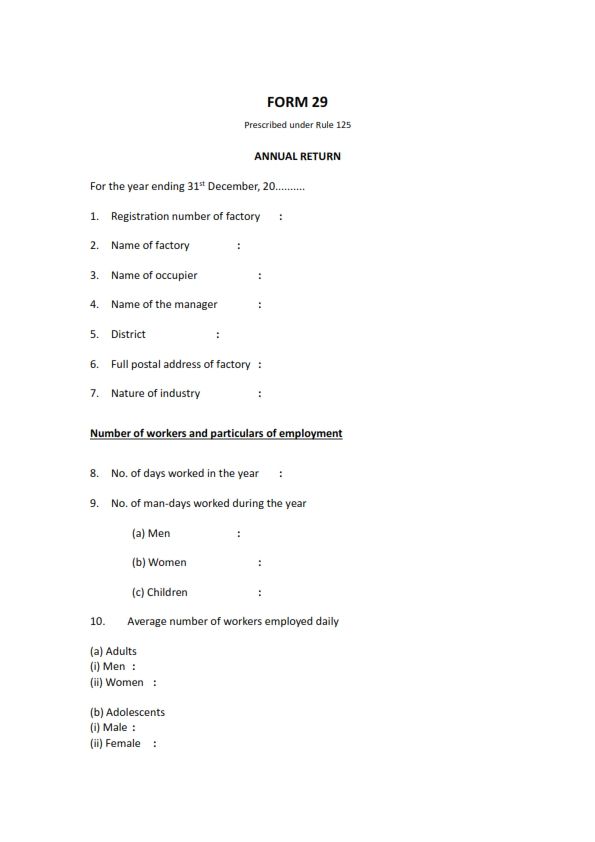
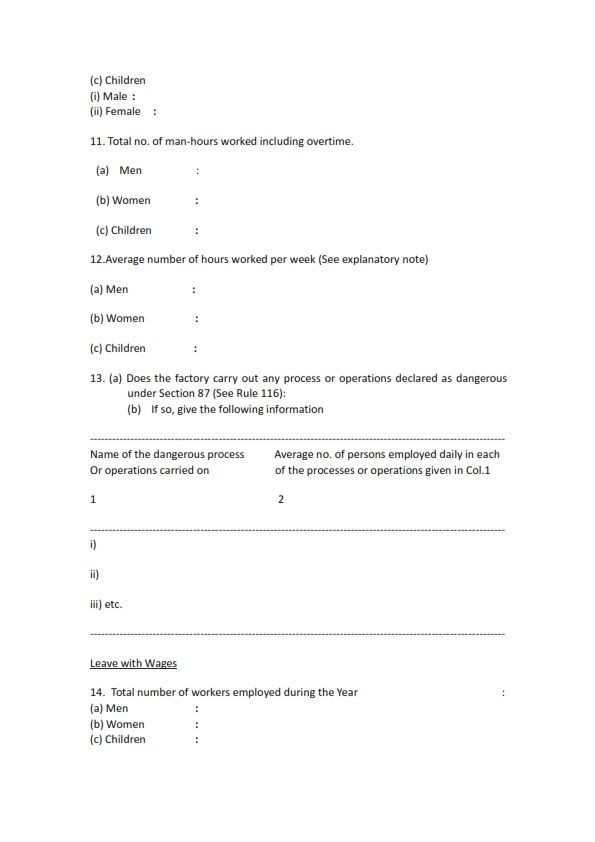
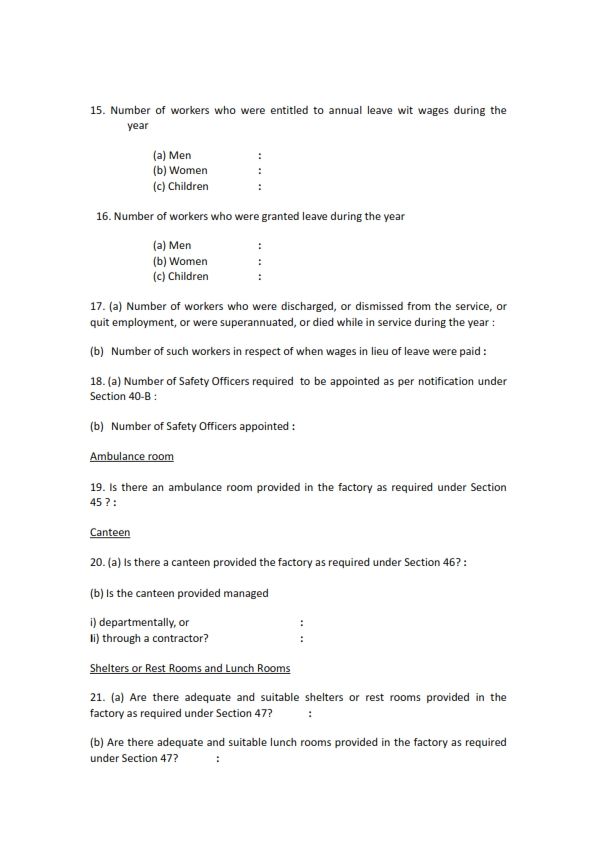
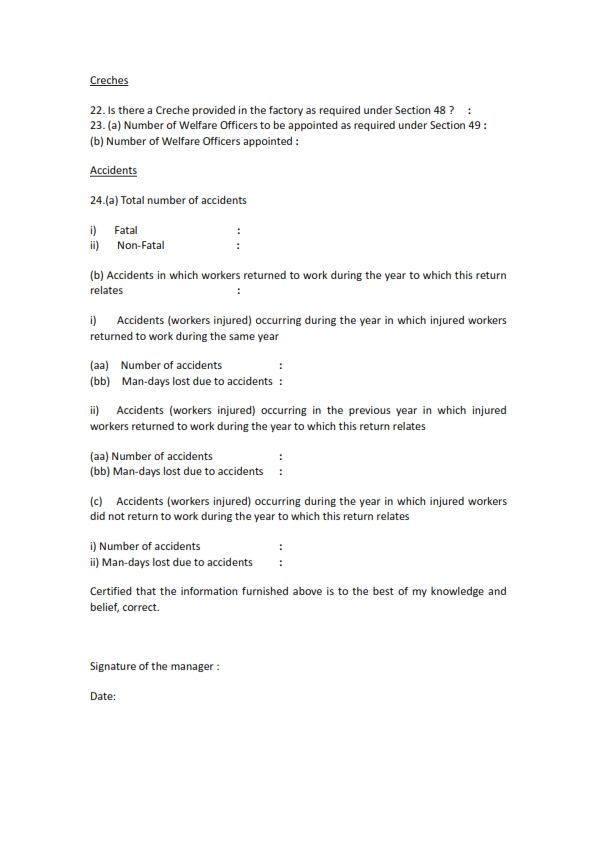
Form ER-I
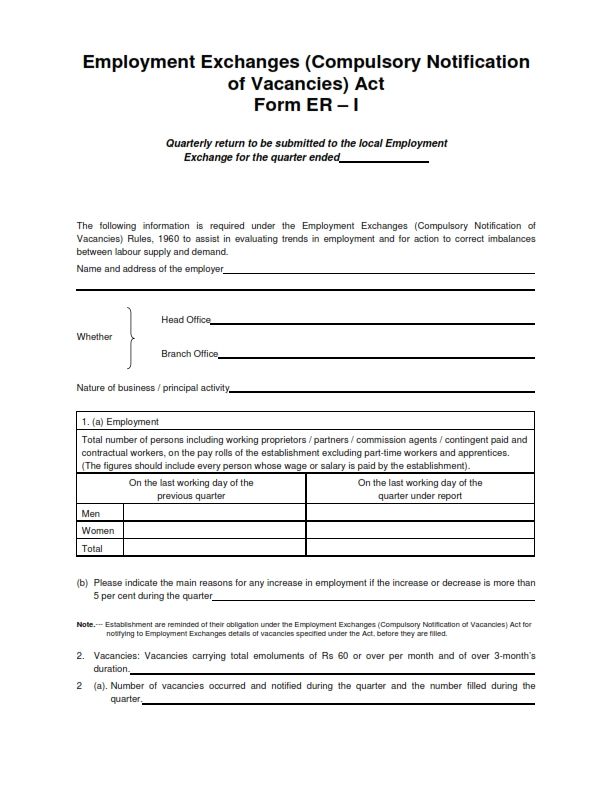
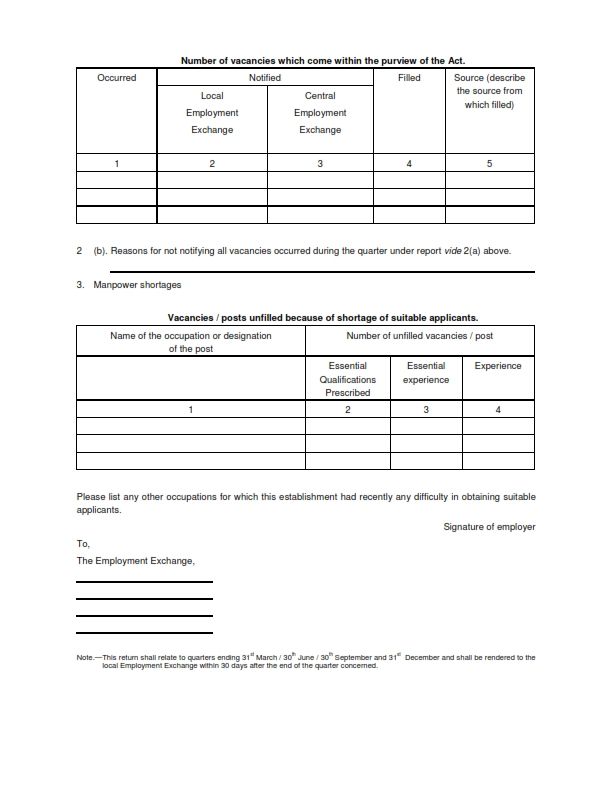
Form LMNO Rule 16 (1)- L
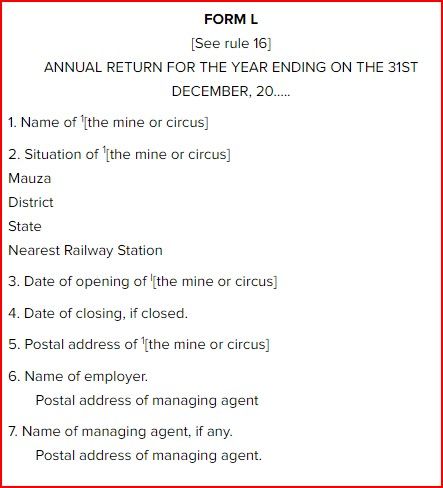
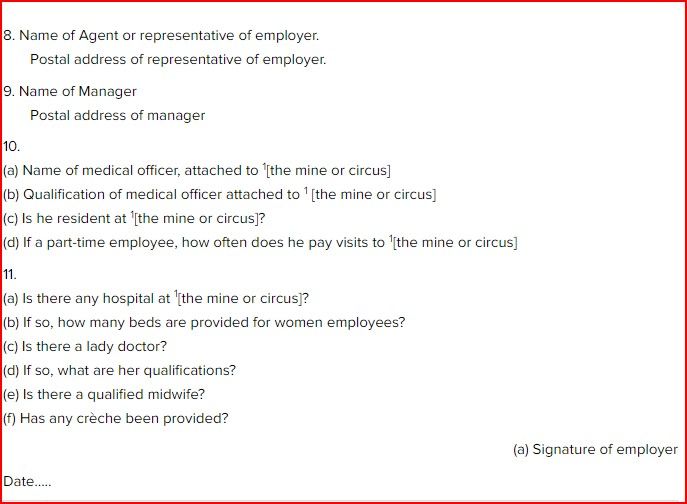
Form LMNO Rule 16 (1)- M
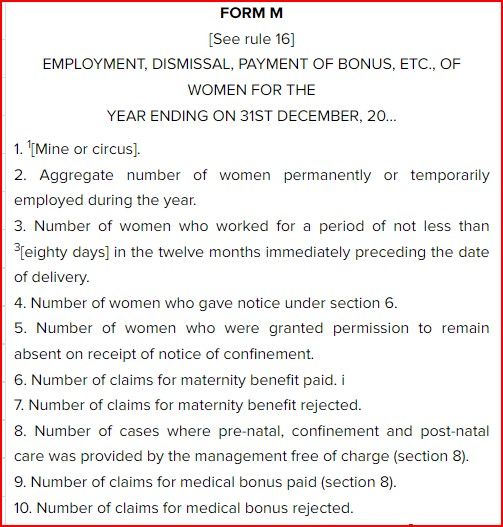
Form M Page 2:
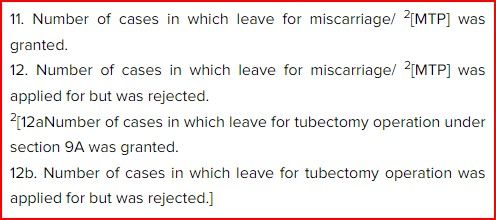
Form M Page 3:
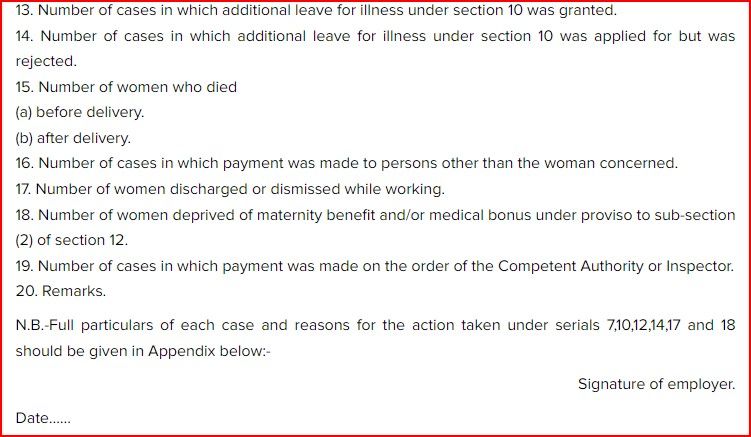
Form M Page 4

Form LMNO Rule 16 (1)- N
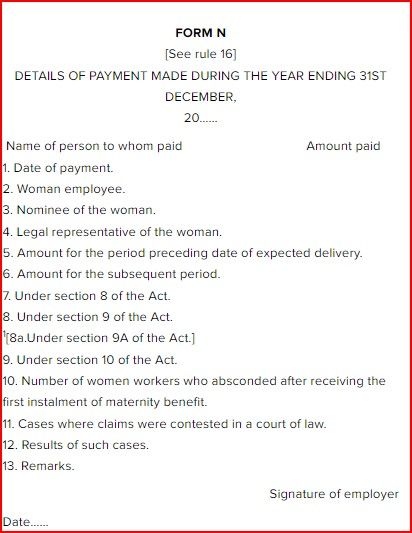
Form LMNO Rule 16 (1)- O
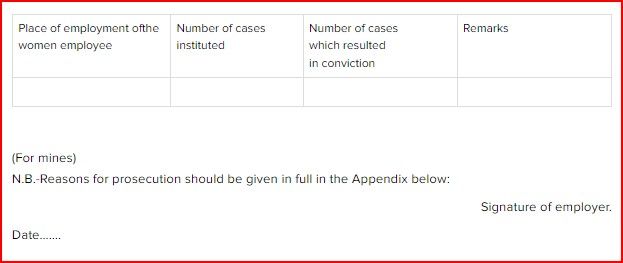
Form 1:
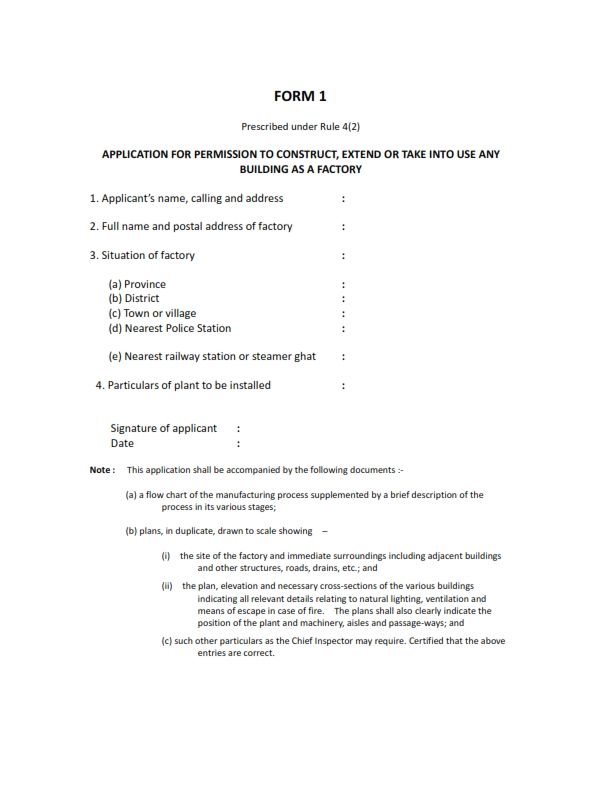
Form 2:
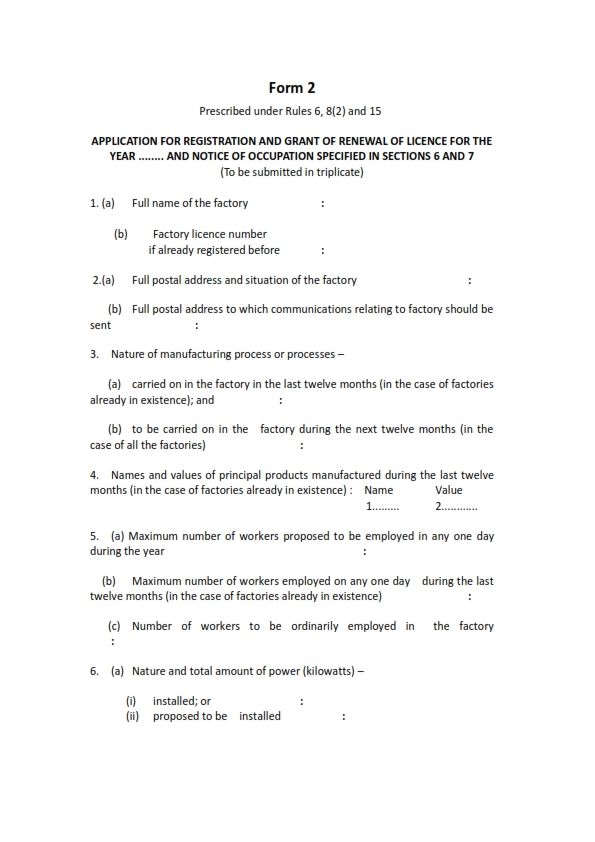
Form 21:
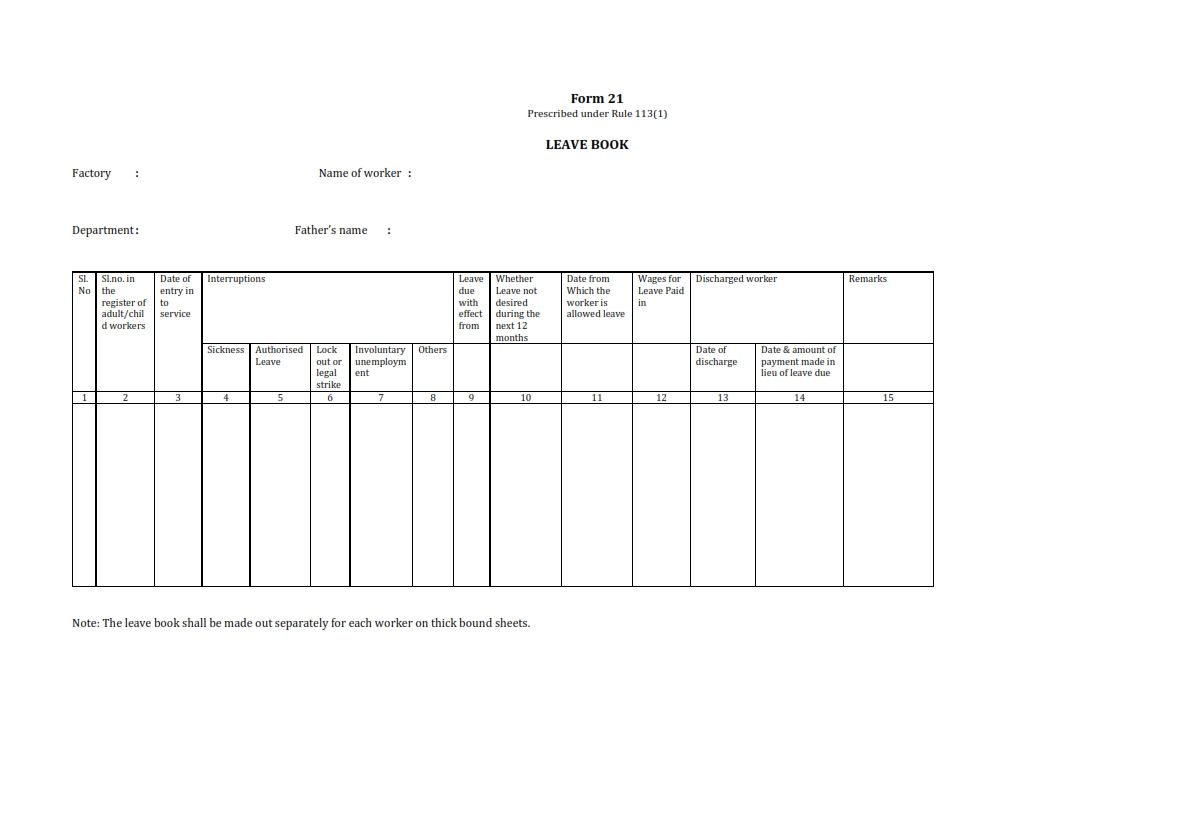
Form 22:

Form XXIV:
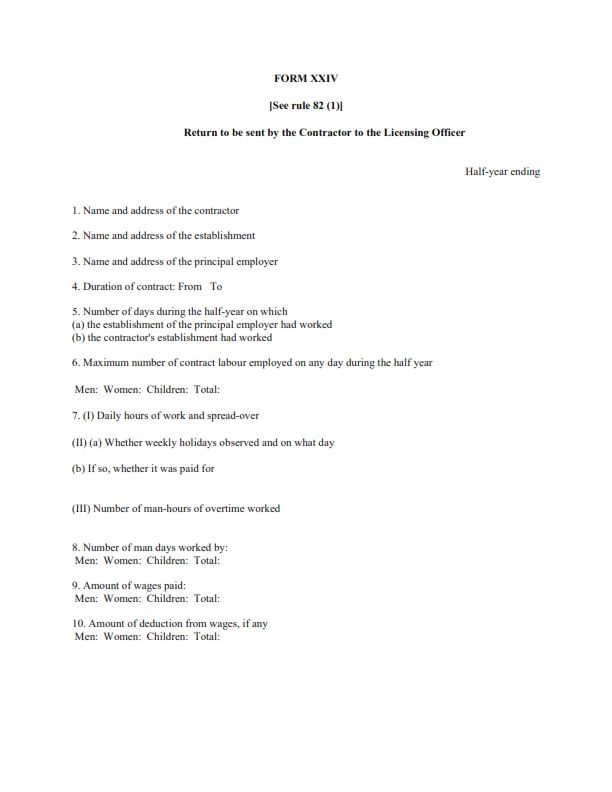
Form XXIII
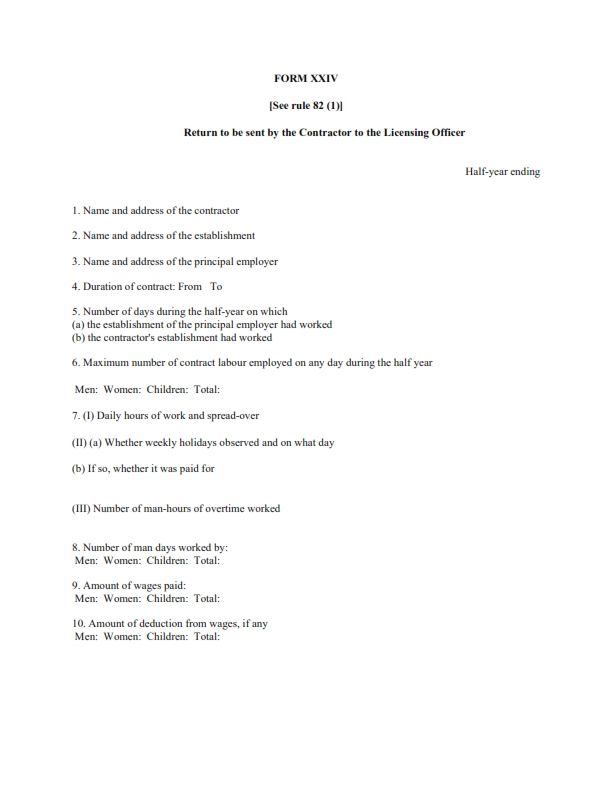
How Can Deskera Help You?
Deskera People helps digitize and automate HR processes like hiring, payroll, leave, attendance, expenses, and more.
Simplify payroll management and generate payslips in minutes for your employees.
In addition to a powerful HRMS, Deskera offers integrated Accounting, CRM & HR Software for driving business growth.
Check out our product video below:
Related Articles





